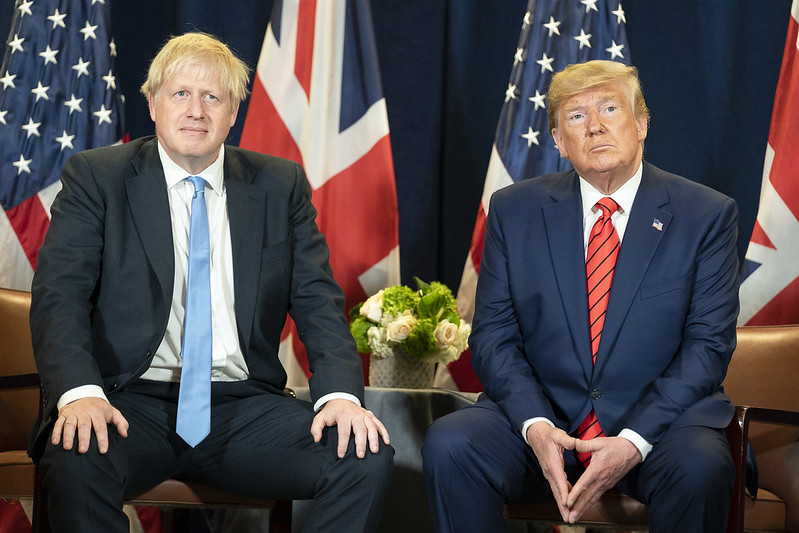 The Covid-19 pandemic has caused a surge in the usage of certain words and word collocations. The language of the Coronavirus outbreak includes phrases such as the ‘fight against’ Covid, the ‘spread’ of the virus, the ‘outbreak’ of Coronavirus and the ‘response to’ the virus. We’ve heard about the ‘pandemic’, the ‘crisis’, the ‘lockdown’, ‘panic buying’ at the supermarkets and the lack of ‘PPE’ in hospitals.
The Covid-19 pandemic has caused a surge in the usage of certain words and word collocations. The language of the Coronavirus outbreak includes phrases such as the ‘fight against’ Covid, the ‘spread’ of the virus, the ‘outbreak’ of Coronavirus and the ‘response to’ the virus. We’ve heard about the ‘pandemic’, the ‘crisis’, the ‘lockdown’, ‘panic buying’ at the supermarkets and the lack of ‘PPE’ in hospitals.
Starting out as ‘Coronavirus’, we then started hearing the illness referred to as Covid and Covid-19 in the later stages of the pandemic, as language became more specific. Different variants have been discussed, such as Delta and Omicron, while vaccines have been rolled out and people have been offered boosters.
Students have learned new words and phrases as governments imposed lockdowns, social distancing, working from home and other measures to deal with the threat of Covid-19. There has also been some criticism of slogans and speeches from political leaders, resulting in a debate about appropriate language usage.
We’re exploring all this vocabulary of Coronavirus in our blog post and sharing some ideas for an EFL lesson using words and phrases highlighted by this global health crisis.
The Covid pandemic introduces new words and phrases
Non-native English students watching the television news, listening to radio discussions or reading newspapers will have met many new phrases, words and sentence constructions through discussion of the pandemic.
Coronavirus news coverage is also teaching students about the right prepositions to use with different verbs:
The ‘spread of’, the ‘response to’, the ‘fear of’, the ‘symptoms of’, the ‘fight against’, the ‘impact of’ the virus
We hear about the ‘strain on’ health services and the ‘effect of’ the lockdown on our day-to-day lives. We are also ‘concerned for’ those affected and ‘worried about’ contracting the virus.
We have seen an influx of phrases related to the precautionary measures introduced and the social effects of Covid-19.
Some other new vocabulary and phrases related to Covid that many non-native English speakers may have recently discovered include: social distancing, self-isolation, quarantine, lockdown, essential travel and non-essential travel, panic buying and stock-piling.
Read our tips on learning vocabulary here.

Buyers started panic buying and stock-piling toilet roll during the first lockdown, as they worried about shortages in supply – image source
Healthcare and medical-related words and phrases are also heard more frequently since the start of the pandemic.
Examples include: outbreak, infection, infectious, exposure, underlying health conditions, vulnerable groups, intensive care, self-isolation, respiratory, ventilator, PPE (personal protective equipment), herd immunity, masks, vaccines and boosters.
Coronavirus, Covid-19 and SARS-CoV-2
The virus itself was originally referred to as Coronavirus, although this word actually describes a family of viruses. Under the microscope, these viruses look spherical with a ‘crown’ of spikes – hence ‘corona’.
The type of Coronavirus responsible for the pandemic is SARS-CoV-2 (severe acute respiratory syndrome coronavirus 2). This is a ‘novel’ coronavirus, which means it is new. This virus can cause the respiratory disease Covid-19 (the word ‘respiratory’ means it affects the lungs).
The terms Covid-19, SARS and Coronavirus have all been used in the news. Specific and general words can become blurred in common speech, although we all know that we are referring to the same virus in the context of the pandemic.
Governments and news outlets now usually referring to the illness as Covid-19. In common discussions and social situations we are now most likely to hear it called Covid.
Epidemic or pandemic – what is the difference?
Non-natives and native English speakers alike might be wondering about the difference between the words pandemic and epidemic.
‘Epidemic’ refers to a disease that affects many people within a certain population or community. ‘Pandemic’ refers to a disease that affects multiple countries around the world.
The prefix ‘pan’ is from Greek, meaning ‘all’ or ‘of everything’ or ‘involving all members’ of a group. In this way, the ‘pan’ in ‘pandemic’ tells us the virus outbreak affects the whole world, not only one country or community.
Covid-19 vaccination language
After the first vaccines were developed and vaccination programmes rolled out around the world, other words and phrases have become part of the language of Coronavirus.
New words for EFL students might include: ‘vaccine’, ‘variant’, ‘recovery’, ‘side effects’, ‘anti-vaxer’, ‘vaxed’, ‘unvaxed’, ‘antibodies’, ‘injection’, ‘needle’, ‘jab’, ‘dose’ and ‘booster’.
Some of the common Covid-19 vaccines are:
Pfizer-BioNTech (Comirnaty) – usually referred to as ‘Pfizer’
Oxford-AstraZeneca (Vaxzevria) – usually referred to as ‘AstraZeneca’
Moderna (Spikevax) – usually referred to as ‘Moderna’
During the vaccine programme in the UK, there was a concern about the AstraZeneca vaccine causing side-effects among some people, in particular, blood clots. This discussion would have raised some new medical language for non-native English speakers.
We have also been introduced to different variants of the virus, which have been called Delta and Omicron.
Working from home and remote working
People with office jobs also started ‘working from home’ during lockdown and this way of working has become a new normal for many industries. Many jobs are now fully remote or hybrid (a mixture of home and office) and many people now expect to be able to work from home regularly, using video meetings instead of face-to-face interaction.
Progressive companies are now hiring for fully remote positions, as they see how much money can be saved without the need to rent a physical office. Hiring remotely also opens up the job market to many more people across the country and internationally, so geography is no longer a barrier to hiring the best talent.
Remote working is also an ideal choice for those who need to care for children or other family members, as it allows a more flexible lifestyle, where work and other responsibilities can exist side by side.
However, some people miss the collaboration and social aspect of working in an office. Some bosses might worry their workers are not working as productively from home. There are also concerns that shops and cafes in town centres are missing out on trade, as people no longer need to buy lunch while they are at work. The debate continues over the pros and cons of working from home or WFH as people often refer to it in messaging.
‘Stay Home’ vs ‘Stay Alert’ – UK government slogans
We have also seen slogans being developed to communicate important messages about behaviour in response to Covid.
In the UK, the government introduced the slogan ‘Stay Home, Protect the NHS, Save Lives’ to encourage people to self-isolate in their homes.
When the government wanted to introduce an easing of the lockdown restrictions, a new slogan was devised: ‘Stay Alert, Control the Virus, Save Lives’. This slogan was criticised for being too confusing. No one seemed to understand exactly what it meant.
Perhaps that was the slogan’s purpose – each person can interpret it how they like. But when we don’t agree on the meaning of a phrase, the risk is that the phrase becomes meaningless, therefore pointless.
After all, most people want guidance during a worrying time and expect the government to hold a firm position and communicate it clearly.
The government’s slogan as part of the UK winter 2020 campaign was ‘Hands, Face, Space‘, which was clearer – they wanted people to wash their hands, cover their face and make space (keep their distance from others) to prevent spreading the infection in enclosed pubic areas.

The UK government’s first slogan – ‘Stay Home, Protect the NHS, Save Lives’ – communicated expectations clearly – image source
War metaphors during Covid
Classic ‘war’ metaphors are often used to describe the fight against any illness. We are ‘battling’ or ‘fighting’ the pandemic and trying to ‘defeat’ it.
These words of aggression can foster a sense of team spirit in a community. UK Prime Minister Boris Johnson described the virus as ‘an enemy’ and an ‘invisible mugger’.
However, these types of ‘war’ metaphors can also serve to increase anxiety among the population.
Using this type of language to talk about the Coronavirus pandemic can be unhelpful if the words create an emotional divide between healthy people and those infected. The infected people might be pushed linguistically into the position of ‘the enemy’.
It can also be unhelpful to cast the virus in this way as a ‘super power’, creating a feeling of hopelessness or even terror, especially for children who might not fully understand the situation.
The ‘alpine tunnel’ of confusing communication
Boris Johnson has used some particularly florid language to talk about the virus. He described the UK’s experiences of Covid-19 as walking through a huge ‘alpine tunnel’ with the ‘sunlight and pasture ahead of us’.
Such poetic and metaphorical language at a time of crisis can be frustrating for people who want straight-forward advice, facts and answers.

Boris Johnson compared the UK’s experience of Coronavirus with walking through an ‘alpine forest’ – image source
Donald Trump, who was President of the United States at the time, also caused concern over his use of language at a time of global crisis.
Trump’s labeling of the virus as ‘foreign’ and ‘Chinese’ could be seen to attach blame. Indeed, his words caused some anger and division – an idea explored in this article by The Conversation.
Both leaders were criticised for their use of language, highlighting the need for both sensitivity and clarity in communication about the pandemic.

1. Boris Johnson and former President Trump were both criticised for their choice of language in relation to the pandemic – image source
Appropriate language to talk about the Covid outbreak
This debate over the appropriate vocabulary and use of language for talking about the Coronavirus outbreak is another potential study area for those learning English.
Holding a classroom debate is always great for language practice. A Covid-19 language debate could address various questions, such as:
- Are metaphors and poetic constructions ever useful when discussing a health emergency?
- Is using such ‘flowery’ language inappropriate in this context – or could this way of speaking help to calm people and bolster a nation’s spirit?
- Was Trump’s use of the phrase ‘Chinese virus’ offensive? If so, why – or why not?
- How does our feeling about the virus change when we use the country China as an adjective in this way?
Most people would agree both leaders could use better or more appropriate language to speak about the Covid-19 pandemic.
For an EFL lesson task, students could be asked to communicate the same messages as Johnson and Trump using different language constructions and vocabulary. Students could also give speeches that they feel would be more appropriate in language and tone.
EFL students could also consider other arguments related to the pandemic, such as the arguments for and against working from home.
The future of the language of Coronavirus
The language of the pandemic is still evolving. We have now adopted the term Covid-19 or Covid in common usage to refer to the illness, in preference to the word Coronavirus, which was used more at the start of the pandemic.
Language students will meet new words, collocations and phrases as we progress towards further reductions in restrictions.
Many places have removed the legal requirement to wear masks, although some people are still choosing to wear a mask in enclosed spaces. In fact, this could be a choice for some people for the foreseeable future, as a way of protecting themselves against Covid.
Wearing a mask is also a way of protecting ourselves from viruses in general, such as colds and ‘flu, and some people see this as a permanent choice that benefits our health.
Indeed, as we learn to live with the virus in our midst, we may find our behaviour and our language usage have both been permanently altered by the Covid-19 pandemic.
Share yours views in the comments
- Have you noticed any new words during news coverage of the Covid pandemic?
- How important is the language we use to talk about Coronavirus?
- What do you think about the communication style of Johnson? Or the language used by Trump?
- Does language have an effect on society’s attitude to lockdown and other restrictions?
- Have you been confused by any words or phrases used during the pandemic?
- Has your government used slogans during the pandemic? Do you think these slogans are effective?
- Have you worked from home during Covid? Did you find it a positive or negative experience?
Attributions
- President Donald J. Trump participates in a bilateral meeting with British Prime Minister Boris Johnson Tuesday, September 24, 2019, at the United Nations Headquarters in New York City. Vice President Mike Pence attends. (Official White House Photo by Shealah Craiughead) via Flickr. Public Domain Mark 1.0.
